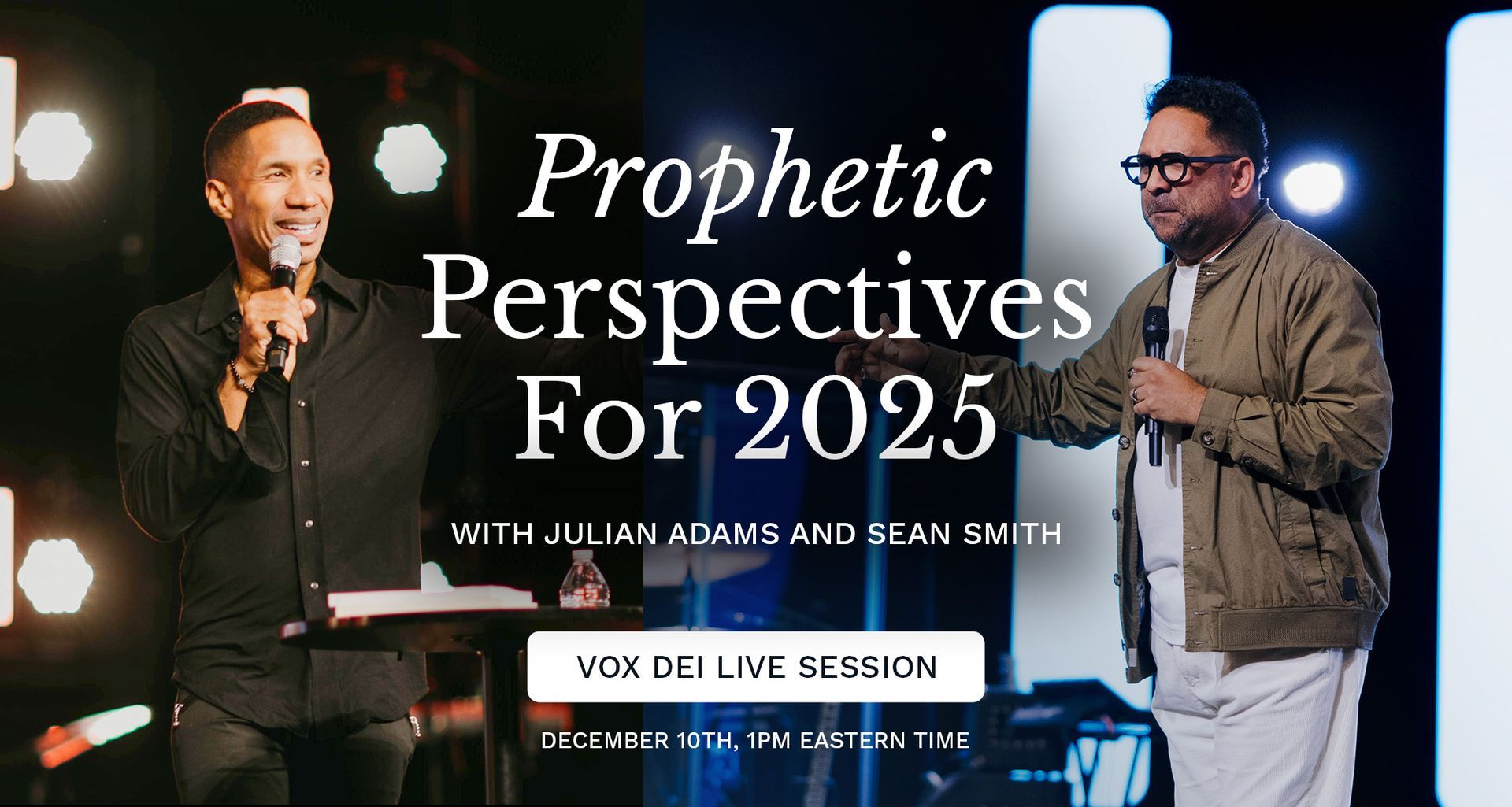Should Prophets Give Words of Judgement?
Julian Adams • September 9, 2018
Many of today’s prophets feel the need to prophesy disaster as evidence of God’s judgement of sin. People have often asked me why I don’t give such words. Listen to my thoughts in my latest VLOG, and look out for our next video, which will be a follow-up. Want more on the prophetic? Read Julian’s book Gaining Heaven’s Perspective.
– TRANSCRIPT
So people often ask me about why I don’t give judgment, prophetic words in the way that I do my prophetic ministry. And I thought I could take a moment to tell you why that’s not part of the practice of my prophetic protocol. Very simply put it’s because I believe that Jesus has paid for every sin past, present, and future, so we never need to worry about sin. Sin is not an issue that God is concerned about. When we begin to understand that, it frees us up to engage with the world in a very real and loving way which is the heart of the prophetic. The prophetic comes to demonstrate God’s love to people. Judgment would always deal with the consequence of people’s sin as a response from God to people as if what we do, God then judges through bad events through natural disasters, through times of suffering or difficulty in response to that sin that we’ve done.
I do not see this as a biblical option simply because the Bible tells us in 2 Corinthians that God was in Christ reconciling the world to himself and not counting their sin against him. God is not weighing up sin or judgment and seeing what he needs to do in order to rectify the scales of sin and bring judgment on people. That’s not his heart. That’s not how’s he working today because Jesus took on all of the sin and all of the impact and all of the rightful punishment that was due to us and He took it in himself so that you and I get to go free. It’s the kindness of God. And I love that the prophetic now gets to reveal that God is not counting sin. He’s not weighing it up, and he’s not trying to work out the measure of judgment that he now needs to bring in order to somehow rectify the balance.
The prophetic reveals the kindness of God. In fact, it always revealed the kindness of God. Some of the earliest pictures in the Bible around the prophetic have got nothing to do with sin and everything to do with the revelation of God’s kindness and his goodness. That is what Moses saw on that wonderful mountain when he was hitting a cliff off the rock. He saw the goodness of God passed by him. And so that’s one of the reasons why I do not walk in a place of judgment or prophesy about judgment towards others because God is not counting our sin against us. God bless you.

If you want to grow in the prophetic, it doesn’t begin with what you say. It begins with what you see. The prophetic is rooted in perception. Not just natural insight, but spiritual awareness—what Scripture calls “the eyes of your heart.” Paul prayed that the church in Ephesus would have their hearts enlightened so they could truly see what God was doing. “I pray that the eyes of your heart may be enlightened in order that you may know the hope to which He has called you…” (Ephesians 1:18) God isn’t distant or withholding. But if we’re going to hear Him clearly, we have to see differently. We need Heaven’s perspective. And that means learning to quiet the noise, tune into His voice, and let Him train our inner vision. You don’t need to wait for a dramatic vision or audible voice. Often, God speaks through a nudge. A mental picture. A scripture that lingers. A sense of burden or joy that feels holy. These are the first signs that your spiritual eyesight is awakening. But it takes time. It takes attention. It takes trust. Just like physical muscles grow with use, your spiritual senses grow as you spend time with Him—not just talking, but listening. Not just asking for answers, but asking for His perspective. You were never meant to live according to what the world says is true. You were meant to live by every word that flows from the mouth of God. A Prayer for This Week: “Lord, open the eyes of my heart. Teach me to see what You see—not just in others, but in myself, in my circumstances, in the world around me. Give me clarity and confidence to trust Your perspective more than my own. Amen.” This week, pay attention to what you notice. The way you see is often the way He speaks.

We are living in a world of dramatic change. The relentless pace of development often leaves us breathless and exhausted. The demand for innovative ways of communicating, inventing, and staying ahead of cultural trends can feel daunting and demoralizing. It can push us into a space where we find ourselves trying to copy rather than be authentic, to imitate rather than create. This pressure can lead us to believe that we need to be more creative, and that our individual stories do not matter. But nothing could be further from the truth. Your story, no matter how small, matters and is powerful. One of the remarkable aspects of ancient manuscripts, like the Bible, is that they tell the stories of individuals whose lives may seem small and insignificant. Yet, God chose to make their lives a memorial of what He could do with a life that the world deems insignificant. The incredible power of the gospel is that it changes lives one at a time. God is as interested in the individual story as He is in redeeming the cosmos. The aim of the gospel is not just dealing with personal sin; it is about restoring individuals to a relationship with a kind Father. In his book Mere Christianity, C.S. Lewis beautifully said, "The Son of God became a man to enable men to become sons of God." Justification addresses our standing before God, but our adoption invites us into a relationship with the Father. It allows us to partake of who He is and to live in a place of deep joy from who He is. Romans 3:23 reminds us that "all have sinned and fall short of the glory of God." Many of us forget that the work of salvation has turned this verse around. Through Jesus, we have been restored to the glory of God. One description of the word "glory" refers to the divine quality, the unspoken manifestation of God, and splendor. It is the revelation of God's intrinsic worth and beauty. Do you see that? We have been restored to His divine quality, splendor, and beauty. In a world where it can be easy to feel like just another face in the crowd, remember that your story is significant. Your experiences, your journey, and your voice matter. Embrace the unique narrative God has given you and let it shine. You are not just a spectator; you are a vital participant in God's grand story. Your authenticity, creativity, and individuality are valuable. As you navigate the rapid changes of our world, hold on to the truth that your story has power and purpose. God sees you, knows you, and has a plan for your life that is uniquely yours. Let us celebrate the beauty and significance of each individual story, knowing that together, we contribute to a tapestry of divine splendor and glory.



